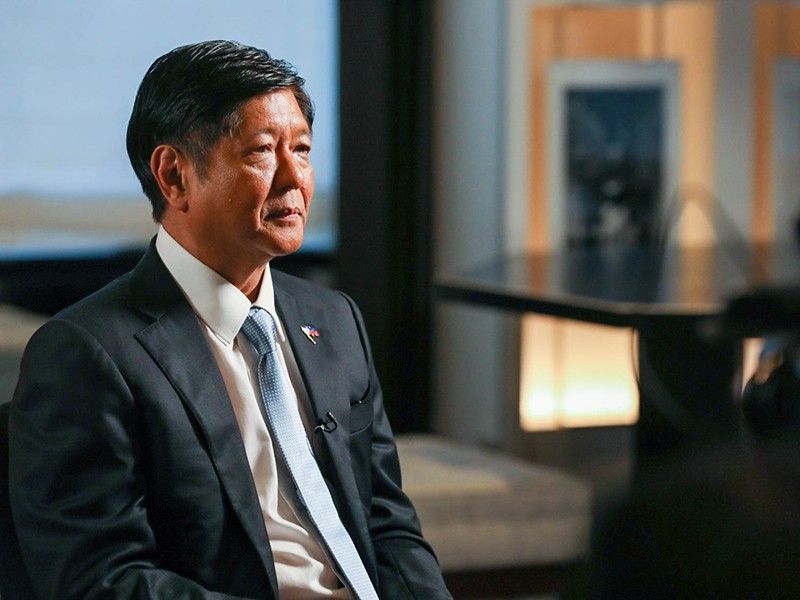
MANILA, Philippines — President Ferdinand Marcos Jr. has vowed to actively prevent International Criminal Court representatives from making any contact with government agencies or officials even if they are allowed to enter the country.
This comes after scathing remarks issued by Sen. Ronald dela Rosa — one of the most prominent architects of the drug war launched by former President Rodrigo Duterte — where he criticized the president for appearing to walk back on his previous stance of not cooperating with the ICC’s drug war investigation.
Marcos said in a news release on Tuesday that he still considers the ICC a “threat” to the country’s sovereignty, vowing to block their access to all government institutions.
“As ordinary people, they can come and visit the Philippines, but we won’t cooperate with them. In fact, we’re on guard to make sure that they do not come into contact with any agency of the government,” Marcos said in a mix of English and Filipino during an interview with the media.
Police personnel and local government officials have also been ordered not to cooperate with any ICC representative, Marcos added.
The Department of Justice said on Tuesday that it has yet to receive an official advisory from the Department of Foreign Affairs regarding the presence of ICC representatives in the country.
In a press conference on Monday, Dela Rosa, who previously served as Philippine National Police chief under Duterte, challenged the president to tell him upfront “if you want us investigated and jailed” and not to “stab us in the back.”
The senator also accused Marcos of changing the government’s official position on the ICC’s investigation into the alleged crimes against humanity committed in Duterte’s war on drugs.
In November 2023, Marcos said that proposals for the Philippines to rejoin the Rome Statute — which created the ICC — were “under study.”
This came amid the House of Representatives’ consideration of three resolutions urging the government to work with the ICC in its drug war probe. These resolutions have since been approved at the committee level.
Before that, the president rejected any move to cooperate with the ICC’s investigation, citing jurisdiction issues.
Kristina Conti, ICC assistant to counsel and National Union of People’s Lawyers secretary-general, said that Marcos’ change of tune was a misstep in the quest for justice for victims of extrajudicial killings in Duterte’s drug war.
“Sliding back to the position of non-cooperation is both a legal and political mistake for President Marcos,” Conti told Philstar.com.
“Again, we reiterate that the ICC investigation has a strong legal basis, having been approved by the appeals chamber over the objection of the Philippine government. The Philippine government participated actively in the proceedings and lost,” she added.
The lawyer also said that the kin of the victims’ “resort to an international court to obtain justice” is “grounded on law and reason.”
“President Marcos should think hard over how history will judge his obstinate refusal to bring justice to the victims of the ‘war on drugs,’” Conti added.
During his term as senator, in 2011, Marcos was among the 17 senators who voted for the ratification of the Rome Statute that created the ICC.
ICC probe authorized in 2023
The ICC appeals chamber in July 2023 authorized the resumption of its investigation into the Duterte administration’s violent war on drugs.
This decision was welcomed by relatives of victims of extrajudicial killings and their lawyers, who believe that the ICC remains the only avenue to hold those responsible for the deaths to account.
Despite the Philippines’ departure from the ICC in 2018, which took effect 2019, the international court retains jurisdiction over the crimes committed when the Philippines was still a member of the court.
The ICC, which is hailed as the court of last resort, previously noted the Philippine government’s inability to adequately prosecute those responsible for the drug war killings, saying that local proceedings have not led to “tangible, concrete and progressive investigative steps.”
Official figures estimate deaths from Duterte’s anti-narcotics campaign at more than 6,000, but estimates from human rights groups peg the actual number of fatalities at around 30,000. — Cristina Chi
*****
Credit belongs to: www.philstar.com
 Atin Ito First Filipino Community Newspaper in Ontario
Atin Ito First Filipino Community Newspaper in Ontario






